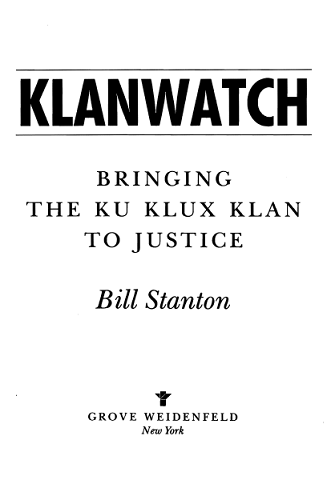Klanwatch
BRINGING THE KU KLUX KLAN TO JUSTICE[/large][/center]

[center]Stanton Bill - Klanwatch.pdf (7.88 MB)
[large]http://www.balderexlibris.com/index.php ... -Klanwatch[/large]
[/center]
[---]
[center][large]About the author[/large][/center]
[justify]A SEVENTH-GENERATION Southerner, Bill Stanton was born in Arkansas in 1953. He was educated at Hendrix College in Arkansas and at Emory University in Atlanta, Georgia, where he received a master's degree in History. From 1978 to 1987 Mr. Stanton worked at the Southern Poverty Law Center in Montgomery, Alabama, devoting most of his energies to the Klanwatch Project, of which he became the director in 1985. He currently works for an alternative sentencing program in New England and is associated with the National Coalition to Abolish the Death Penalty.[/justify]
[---]
[center][large]Preface[/large][/center]
[justify]IN THE early 1970s the Ku Klux Klan was written off for dead. Down to a paltry fifteen hundred members-far below its modern peak of fifty thousand during the civil rights era-the so-called hooded order appeared to be on its way to oblivion. Twice previously since its founding in the 186os, however, the KKK had seemed headed for extinction, only to stage remarkable revivals. And so it was that history seemed to repeat itself as the decade of the 1970s wore on. Gradually, almost imperceptibly at first, the KKK made its way back from the brink. Few in the civil rights community, or anyone else for that matter, took the resurgence very seriously at first-until May 26, 1979, that is.
That day a mob of approximately one hundred robed Klansmen attacked a Southern Christian Leadership Conference march in Decatur, Alabama, seriously injuring several demonstrators and sending a wake-up call to activists around the country. Six months later the killings of five anti-Klan protesters in Greensboro, North Carolina, underscored in the starkest terms the threat the KKK once again posed. By then it was clear to virtually everyone: The Klan was back. I was employed as a paralegal at the Southern Poverty Law Center (SPLC) in Montgomery, Alabama, when the Center-a private, nonprofit civil rights law firm-took up the fight against the KKK in the wake of the Decatur episode. For much of the next decade, until September 1987, I worked on the Center's Klanwatch Project, first as an investigator, then as director of the multipronged anti-Klan program, which filed lawsuits, published educational materials, and monitored the KKK nationwide.
Our efforts to launch a broad-based attack on the Klan, something that had never been done before, produced some notable successes : A documentary we commissioned received an Academy Award nomination, and a history of the KKK we wrote for high school students (and placed in every public high school in the country) was acclaimed by scholars and educators alike. But it was our litigation against the KKK that proved, perhaps, to be the most important component of our work. Using federal civil rights laws seldom employed since their passage by the Reconstruction Congress, Center attorneys filed lawsuits against the Klan all over the South on behalf of the victims of KKK violence, resulting in the dissolution of one Klan faction and the bankrupting of another.
Along the way we cracked a conspiracy the FBI had been unable to solve and uncovered evidence that led to the convictions of more than two dozen Klansmen on charges ranging from civil rights violations to murder.
This book recounts some of our experiences in bringing the Klan to justice. I have written it not merely because the stories are interesting or poignant but because they are enlightening as well. They reveal much about the contemporary South: how far it has come since the sixties in terms of race relations and social and economic justice and how far it yet has to go.[/justify]
[right]Bill Stanton
December 5, 1990[/right]